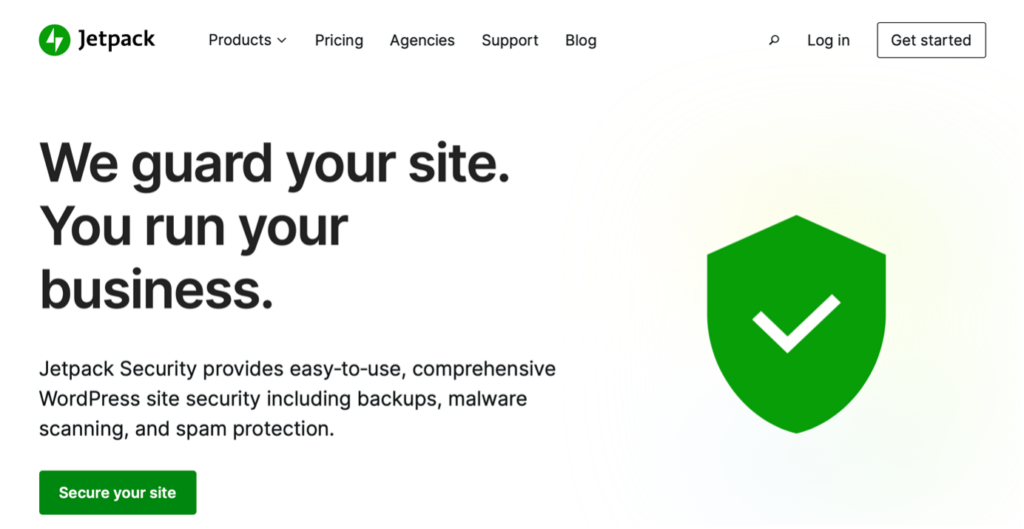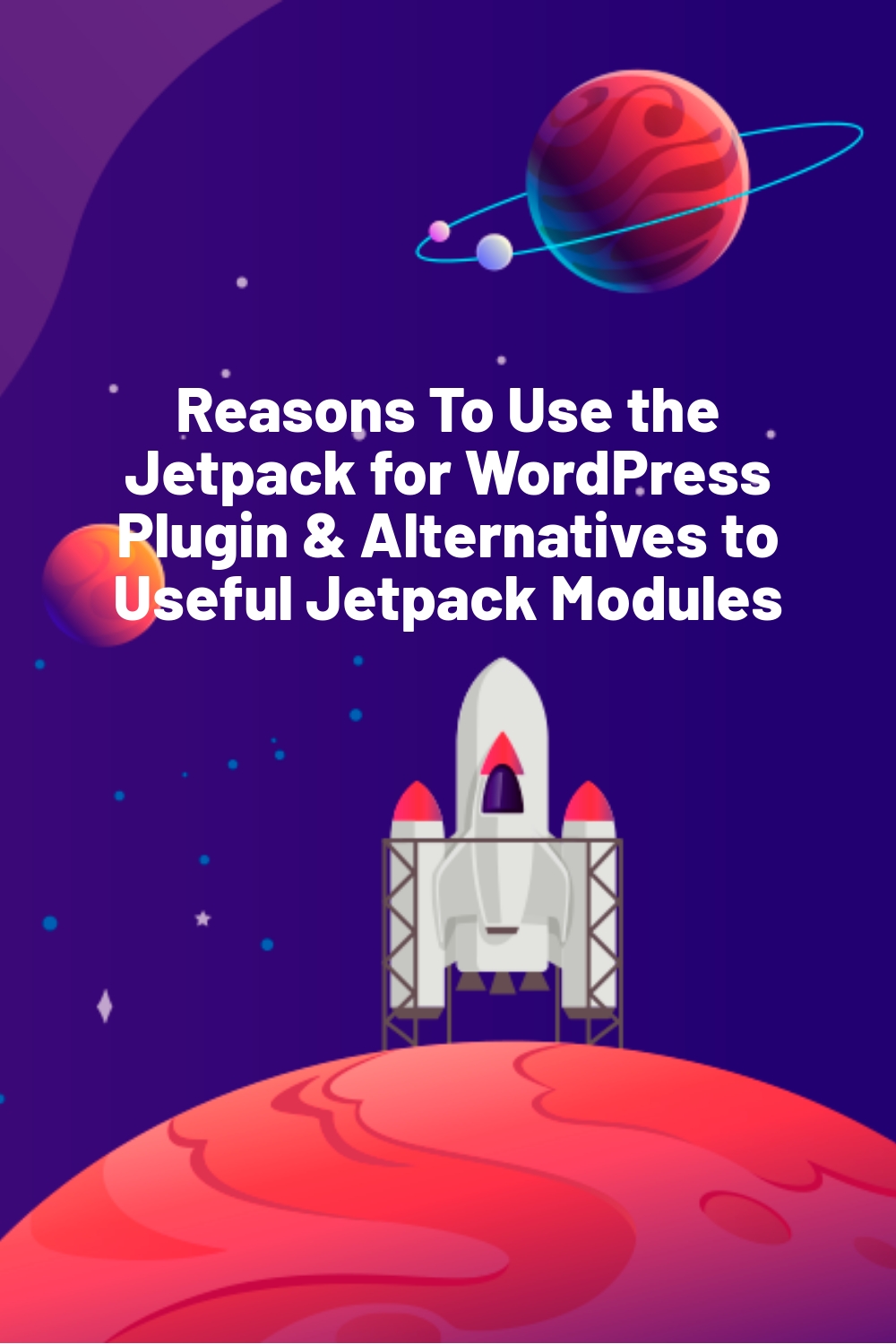WPLift is supported by its audience. When you purchase through links on our site, we may earn an affiliate commission.
Reasons To Use the Jetpack for WordPress Plugin & Alternatives to Useful Jetpack Modules
WordPress is a fantastic platform. Thanks to an abundance of themes and plugins, it offers virtually limitless options for creating websites of any kind and at any scale. The downside of that is you often end up bloating your site with numerous plugins. This is where Jetpack for WordPress steps in.
What Does Jetpack for WordPress Do?

Jetpack is an all-in-one plugin for WordPress that contains a range of features that render some other plugins redundant. That brings several benefits:
- Fewer plugins mean your site is less bloated and therefore will perform better.
- Replacing several plugins with one reduces the risk of compatibility issues, particularly given they will update at different times.
- One plugin doing the job of several is invariably more cost-effective.
Jetpack was developed by the highly respected developer, Automaticc, who are also famous for creating the wordpress.com service (not to be confused with wordpress.org software) and many other popular WordPress-related products. What’s more, they have a solid reputation in the WordPress world for ensuring their products are regularly updated and properly supported.
Reasons To Use Jetpack
As I have already mentioned, Jetpack covers several roles on a WordPress site. Here are the key ones:
Enhanced Security Features

WordPress in its native form is very vulnerable to attacks of all kinds due to its basic security features.
In fact, according to statistics published by TechRadar, an astonishing 1.6 million WordPress sites were hit with a barrage of attacks over a 36-hour period. Scary, right?
Adding Jetpack to your WordPress site will not only help safeguard your site from a range of security threats, but it will also allow you to recover or repair your site should the unthinkable ever happen.
Key security features of Jetpack include:
- Brute force attack protection to prevent attackers from targeting your WordPress login page.
- Spam comment protection to stop annoying entries appearing in your comments and form entries. This uses Akismet powered anti-spam features.
- Protection against malware and other code threats via regular security scanning.
Jetpack also includes a number of other security features for added peace of mind, including:
- Jetpack records all activity on your site in an activity log showing all changes made and by who. This can help enormously with troubleshooting, maintenance, or simply seeing who’s been messing around with your site.
- A secure login using WordPress.com, with the option of two-factor authentication for added protection.
- The plugin continually monitors your site’s uptime and downtime, with instant email alerts of any changes.
What’s more, you don’t need to worry about losing your site’s data following a major catastrophe, as Jetpack performs real-time automatic backups which can be restored with just a single mouse click. Additionally, it is possible to create complete database backups and repair broken sites by restoring older backups.
Finally, should you ever need to migrate your WordPress site to a new host or transfer your theme files and plugins to a new database, Jetpack can help with that, too. Furthermore, it will create a staging site for you to test plugins and modifications before setting them live on your website.
Performance

1 We’re all speed freaks, and I’m not talking about the kind you buy from a shady dealer on a street corner. It’s 2023, and we all expect web pages to load in the proverbial blink of an eye. Google is hooked on speed, too, penalizing pages simply for being milliseconds too slow.
To prove how impatient we have become, Unbounce carried out a survey that revealed almost 70% of consumers admitted that page speed plays a significant part in their willingness to purchase from an online retailer. Additionally, Deloitte Digital published a report titled Milliseconds make Millions that reads like the script of a video nasty. It reveals data gathered by Google demonstrate that page loading speeds exceeding a single second causes users to lose focus, while ten seconds sends them running for the hills.
Thankfully, JetPack includes several features that can help boost your page speed:
Jetpack CDN (Content Delivery Network)
Usually, when users visit your web address, their browser requests the site from the host server. Unfortunately, the server is likely located thousands of miles from the user, so the data transfer takes longer than if it were just down the street.
However, using a Content Delivery Network, or CDN, such as the one included for free with Jetpack, the physical distance between visitors and the data they want to access is significantly shorter. This is done by using a network of servers located in different geographic locations globally.
Data from your website is cached statically on these servers. Therefore, whenever someone visits the site, the cached copy of the content on the server nearest them can be retrieved. The result: significantly reduced loading speeds which help boost SEO and Google rankings.
The CDN feature of Jetpack for WordPress is free. However, if your site has video content, you will also need Jetpack’s video hosting service, VideoPress. That currently costs $59 per year, but that price does include 1TB of storage.
Jetpack Boost
Another free feature of Jetpack that helps improve the performance of your website is Boost.
This provides single-click optimizations to help maximize the performance of your WordPress site. Furthermore, SEO is enhanced thanks to improved web vitals scores.
Jetpack Boost comprises three elements:
- Optimize CSS Loading – This feature generates Critical CSS for your site’s homepage, posts, and pages. It helps content load much faster and is especially good for mobile device users.
- Defer Non-Essential JavaScript – This shifts some tasks until after the page has loaded, resulting in important visual information appearing sooner.
- Lazy Image Loading – Without lazy loading, websites load all images on a page in one go. Therefore, pages containing many images will be inherently slow to load and consume considerable bandwidth. However, because lazy loading serves only the images the user can physically see, the page loads much faster. Images further down the page load only as the user scrolls.
Those three together can help improve your site’s performance in terms of speed and bandwidth. Furthermore, a faster site means an enhanced user experience for visitors.
Grow Your Audience

JetPack includes three elements that are key to growing your website’s audience:
Customer Relationship Management (CRM)
In a nutshell, CRM is the process a business (or other organization) uses to administer interactions between it and its customers. Typically, this process uses data analysis to study significant amounts of information.
Jetpack’s CRM is a suite of tools designed to help your business grow. Furthermore, being modular, you can choose just the tools you need, which include:
- Contact and task management to help you keep track of leads and business activities
- Quotation, invoice, and transaction management
- Integrations with things like Slack, PayPal, Gravity Forms, and WooCommerce
Site Statistics
The most valuable information about your site is its stats. While many people think traffic is the most important thing to monitor, it goes far beyond that. For example, wouldn’t it be helpful to know which of your posts are performing best, the geographic locations of users, and when they visit your site?
Having that kind of data to hand allows you to get a highly detailed demographical picture of your users and their behavior on your site. That will enable you to focus your efforts precisely where they are needed.
The stats that Jetpack provides gives detailed insights into things like the most popular content, what search terms people are using, when they visit it, and where they are located geographically. What’s more, it is possible to include or exclude registered users from those stats, and you can even make the reports available to other registered users if you wish.
Social Media Automation
Love it or hate it, social media is fundamental to the marketing strategy of most businesses, and that’s not going to change any time soon.
Unfortunately, most businesses find dealing with social media a real pain, so tend to neglect it. As a result, many miss out on driving traffic to their site from platforms such as FaceBook, Instagram, TikTok, and Twitter simply because they think there are tons of more important things to do.
Building a solid following on social media does indeed take time and resources. Harder still is keeping audiences engaged so that they don’t lose interest in what you have to say and go elsewhere.
Jetpack has a suite of tools to reduce that burden by helping automate social media posts. For example, you can schedule and automatically publish social media posts to the most popular platforms. Furthermore, you can gather statistics on your posts, such as likes, shares, comments, etc., which allows you to see what works and what doesn’t.
Together, those features will help you get a grip on your business and drive it forward to haul in more visitors and convert them into customers.
What Does Jetpack Cost? Is It Free?
JetPack has over five million active downloads from the WordPress plugin directory alone, so saying it is popular is an understatement. However, the burning question is, what does it cost?
The core plugin won’t cost you a single penny, yet it includes plenty of great features to get you started, including CRM, CDN, protection from brute force attacks. In my opinion, it is most suited to individuals and small businesses, and maybe some medium ones at a squeeze.
However, as your site and/or business scale, you’ll probably want to consider upgrading the plugin to enhance its feature set, and it is here you will start having to pay.
Currently, Jetpack offers three subscription bundles that greatly enhance the features of the free plugin.
Click here for a comparison of precisely what each plan (free and paid) includes.
The prices of each bundle are as follows:
| Bundle Name | Monthly Price | Yearly Price |
| Backup | $9.95 | $47.20 |
| Security | $24.95 | $119.20 |
| Complete | $99.95 | $479.20 |
It is also possible to get some of the individual add-ons and extensions (both free and paid) of Jetpack without having to buy an entire bundle. These are:
| Product Name | Monthly Price | Yearly Price |
| Anti-Spam | $9.95 | $47.20 |
| Site Search | $9.95 | $47.20 |
| Scan | $5.00 | $24.00 |
| VideoPress | $9.95 | $47.20 |
Please note that the yearly prices shown include a 60% discount for the first year, a promotion running when I wrote this article. Renewals in subsequent years are likely to be charged at the full price. Click here to check the current prices.
All paid bundles and products come with a refund policy (14-days for yearly and 7-days for monthly plans) and priority support.
Alternatives to Jetpack Modules
While I thoroughly recommend Jetpack for the range of features it includes in a single plugin, undoubtedly, some people may only need one or two of them. Therefore, it may be better to use other individual plugins to get those features in such a case.
The following are some suggestions for plugins that will allow you to get the individual features of Jetpack:
Forms
The most popular plugins for building forms are WPForms and Gravity Forms. Unfortunately, both are premium plugins, so you’ll have to pay for them. However, you get tons of features for your money. I recently made a head-to-head comparison of the two for WPLift, so please do read that if you’d like to find out more about them.
Should you have little or no budget available, Ninja Forms is worth considering. The core plugin bundles many useful tools for zero dollars, expandable with extensions that you buy individually or in bundles.
In case you are just looking for a contact form superior to the basic one included in WordPress, Contact Form 7 is a popular and entirely free option.
CDN
Several CDN plugins are available that can give you access to a content delivery network to speed up your site. These include:
You can read all about these in WPLift’s article 8 Best WordPress CDN Services for 2023(Free & Paid)
Site Stats
Given it has over three million downloads from WordPress alone, Monsterinsights is one of the most popular Google Analytics plugins for WordPress business websites.
A free version is available, albeit with limited features. However, the Pro versions start from only $99 per year and add plenty of extra goodies that will allow you to analyze your site traffic and users in detail.
Alternatively, you can try WP Statistics, which is a free plugin that can be upgraded by adding extensions. Those extensions can be purchased individually or in bundles. The bundles are more cost-effective if you are adding more than one extension. Either way, the free version has more than enough functionality to get you started with understanding your site stats.
Image Galleries
There are many plugins available for creating fancy image galleries on your WordPress site. WPLift’s article 7 Best Photo Gallery plugins for WordPress in 2023 tells you about seven of the best:
- NextGen Gallery
- Foo Gallery
- Photonic
- Envira Gallery
- Gallery PhotoBlocks
- Photo Gallery by 10Web
- Robo Gallery
In that article, I’m confident you’ll be able to find a gallery plugin that fits your needs and budget, even if the latter is zero.
Security
For me, site security is of paramount concern, and it should be yours too. Unfortunately, cybercrime is here to stay, and the techniques used by the criminals behind it are becoming increasingly sophisticated.
Jetpack is one of the industry leaders in WordPress security. However, if you wish to go down a different route, here are three plugins that might fit the bill:
Should you be interested in any of those plugins, there is a detailed comparison of all three in WPLIft’s article 3 Best WordPress Security Plugins to Lock Down Your Site.
Backups and Restores
Regular site backups are also subject close to my heart. I recently suffered a significant outage on my sites that I could not fully recover from, simply because I relied solely on my host’s (scant) backup service.
4 Please avoid making the same mistake and make site backups a regular habit. As mentioned earlier in this article, Jetpack can handle that for you. However, there are other options, and I wrote about those in 8 Best WordPress Backup Plugins to Protect Your Site Like a Pro in 2023
Now that you have read this article, I hope you will agree that Jetpack would be a beneficial addition to many websites. Even the free version offers great features for securing your site, optimizing its performance, and growing your audience and, ultimately, your business.
Furthermore, its versatile pricing structure for the premium features allows you to add (or remove) them as your site and business scale.
However, if you decide that Jetpack is not the right option for you, plenty of plugins exist that can replicate its features individually. However, while that’s fine if it is just one or two of those features you need, replacing them all with separate plugins would defeat the object and bloat your site unnecessarily.
Tell me, are you already using Jetpack? Which of its features do you like the most, and is there anything you really dislike? And if you are not using it, do you plan on doing so in the future.
As always, I’d love to read your comments and receive any advice you have.








Cheers, Handy!
Hi Oli! Thanks for the info. Looks like good stuff to pick up! This plugin probably provides high workflow. However, I basically work in Photoshop with PSD, which I need to publish to WordPress. What way would be the best functional way to publish templates to wordpress?
You need to code your designs into HTML / CSS first, then make them into wordpress theme files.
There’s some resources to help you here :
https://wpmu.org/how-to-create-a-wordpress-theme-15-essential-resources/
Or you could use a 3rd party company to create it for you :
https://codemyconcept.com
hello! i publish psd templates to wordpress with Divine Elemente plugin (for photoshop). if there is no coding experience, it migh help (not everybody here is good at coding, right?)
folow: https://elemente.divine-project(dot)com
Just had a quick look at that, I doubt the code produced is of a high enough quality – these tools which create code from PSDs never are – It might look ok in your browser but will be slow to load and hard for robots and other devices to read.
I have taken a look at the code recently, and have to admit everything’s done pretty well. They have some gaps, but apparently are still correcting the code. For professional developers the plugin can be used as a prototyping tool for quick template presentation to a client and then a bunch of functionality added later.
I am very thankful to the author to write this fruitful information.It is worth sharing for other users.Thanks once again